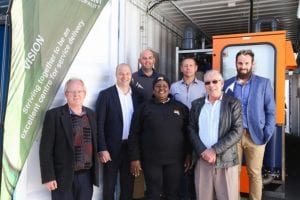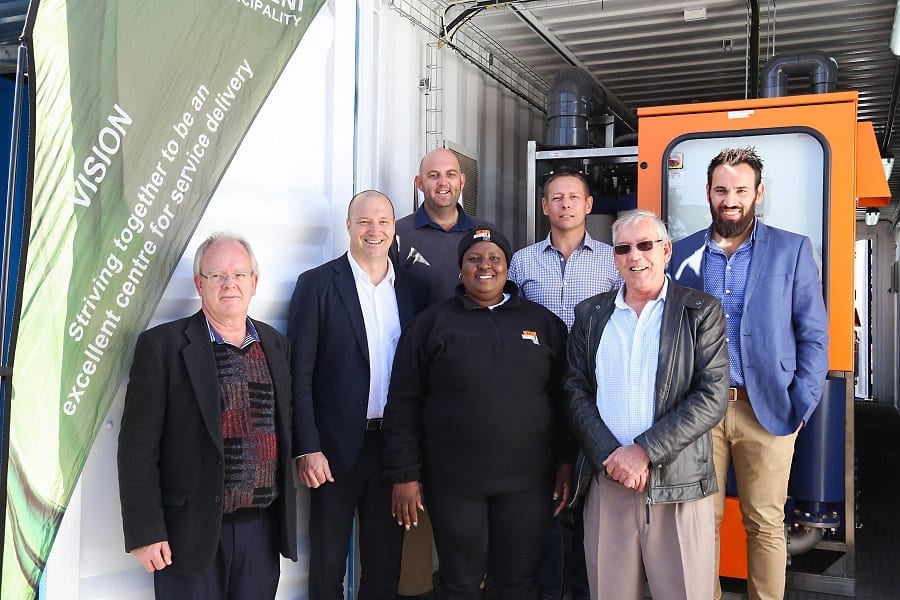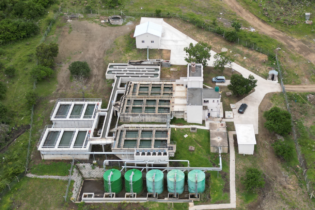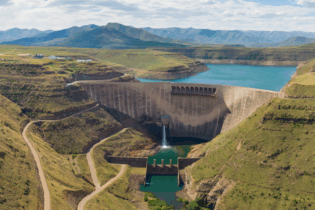Municipal focus
NuWater recently supplied one of its packaged sewage treatment plants to eMalahleni Local Municipality for the purposes of increasing facility efficiency while enhancing income generation. “We run the plant on a build-own-operate contract and the municipality benefits because this arrangement means no capital budget is required. The plant is financed through operational budgets, as it generates additional income to the municipality through having more product to sell to consumers. This provides the municipality with added flexibility and the ability to use this additional income to pay for the facility,” explains Morisse. Mining sector Compared to municipalities, the mining sector has been more accepting of rapidly deployable packaged treatment plant technology in a shorter space of time. “Mines generally see water treatment as a business undertaking. They know that if they recruit professional water service providers such as NuWater, we’ll be able to deliver on deadline, at the required quality. They can see a demand and we offer a fast, effective solution,” says Morisse. As a result, NuWater is enjoying more and more success in marketing its products to this sector and to industry. While municipalities have been slower to appreciate the flexibility offered by decentralisation, things are starting to change. Agri-business Morisse notes that the biggest user of water globally is the agricultural industry. “As farming becomes more professionalised and scientific, we’ve increasingly noticed that farmers want to improve the quality of water used on crops and for livestock to improve their outputs. Gone are the days when a farmer simply sinks a borehole and accepts whatever quality of water comes out. As the agri-trends toward consolidation and corporatisation continue, we foresee a higher demand for reliable treatment solutions coming from the sector,” he adds. Different crops require different pH balances and mineral levels. NuWater engages with its clients in the agricultural sector to ensure they get the water specifications they need for optimal success. Market differentiator “We often reinvent processes and designs available in the local market so that they are cost-effective, save space, and are easily transportable and rapidly deployable. All of these things culminate to make NuWater’s solutions wholly unique,” says Morisse. “We also boast a large stock-holding of readily deployable units, as well as spares and consumables. This makes for an excellent turnaround time during the initial project but also in the support thereafter,” he adds. NuWater has operations in South Africa, Singapore, Mexico and the UK. Most of its local manufacturing takes place at the company’s Cape Town head office. “We’ve developed much of our intellectual property in South Africa, which we’ve then gone on to market in other regions. For example, our 16 inch seawater desalination membrane was developed here. That’s a world first,” says Morisse. “Given NuWater’s position as a market leader, and global leaders situated in Africa, we can say with confidence that future opportunities are likely to come about in the municipal, agricultural and mining sectors for the reasons stated above. We also predict a continuing trend where mines will prioritise recycling their water as part of mining houses’ internal initiatives to promote good environmental stewardship,” he concludes.
As a new member of the NuWater team, James Morisse, executive: Business Development for Africa, offers unique insights into how the company foresees its role in maintaining water supply security across different markets and sectors.
In my 17 years working in the water sector, I’ve never been aware of a company that puts the needs of its customers first the way NuWater does. A lot of firms put unnecessary systems and paperwork in place internally, which ultimately affects the customer negatively. At NuWater, we do things differently, in that it’s always about what the customer wants to achieve in terms of their water quality needs. Another thing that drew me to working here is the exclusive focus on water. I’ve worked at other multidisciplinary organisations but NuWater’s business model has allowed me to focus and specialise, as well as gain experience on a diverse range of water projects,” says Morisse. While it’s a given that, in sub-Saharan Africa, many local government institutions struggle to keep pace with providing services to their growing populations – especially in times of water scarcity – Morisse believes that some of the region’s biggest challenges actually come from a lack of enforcement.
Sub-Saharan challenge
“Probably the biggest challenge facing sub-Saharan Africa in terms of water management is a lack of regulation. There is little to no prosecution of users who illegally dump polluted water without treating it effectively. Industrial water users have a responsibility to discharge water that is at least at the same quality
as was when received. When this is not done, our surface and groundwater supplies become contaminated,” he says.
While blue-chip companies have been leaders in treating water and discharging clean supply back into the environment, Morisse points out that other players need to follow suit if there is to be enough water for future generations. “Water is becoming a serious business risk and what many smaller players conveniently forget is that what they don’t treat now is going to affect them further down the line. The only way to combat this short-sightedness is for more licence inspectors to be active in the field and for more prosecutions to take place – a slap on the wrist just doesn’t work,” he explains.
Engineered solutions
NuWater offers rapidly deployable modular filtration systems, which include reverse osmosis, ultrafiltration, seawater desalination systems and sewage treatment systems. “The latter has been particularly well received throughout various market sectors”, comments Morisse.NuWater’s “modular and mobile” solutions have stood out in the local marketplace for their ease of transportability, featuring a construction option for fast attachment to and detachment from the back axle of a truck, after which quick connections facilitate rapid, easy installation.
“Some of our larger units can be mounted on top of these trailer-type arrangements and we offer these as rental units. Alternatively, we build plants into 6 m and 12 m shipping containers. Those then are easily transported via road, rail or sea,” he adds.








